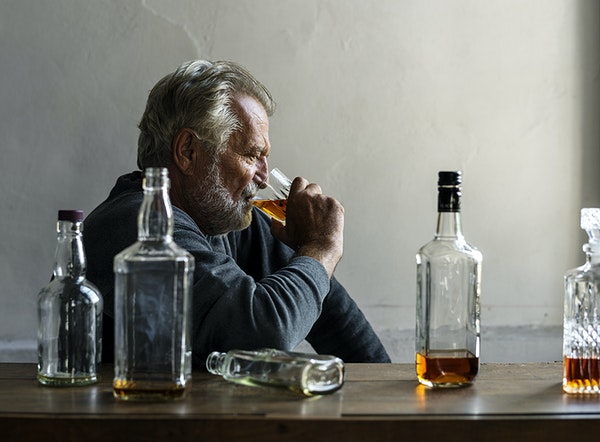Updated September 29, 2022 by BetterHelp Editorial Team
Some people believe that addiction is a choice. Other people think that addiction is something beyond the average person’s control. Both of those views have some truth.
Here, we’ll talk about the two significant kinds of addiction and how they work. Specifically, we’ll talk about how addiction starts, why it’s difficult to kick, and how it begins.
The Two Main Types of Addiction
When you think about addiction, you might think about drug addiction. You may think about addictions to things like gambling or pornography. Both of these are real but different forms of addiction.

Living A Healthy and Full Life After Addiction Is Possible
Speak With A Therapist To Learn How
How a person engages in them and their effect on the person are very different, but addiction works in the brain largely the same for both of them. Let’s look at behavioral addiction versus substance addiction more in-depth. Behavioral addiction is an addiction to an activity or process. Substance addiction is an addiction to a chemical.
Behavioral Addiction
While most people probably think of substance addiction before they think of behavioral addiction, it makes sense to first talk about behavioral addiction.
Our ancient ancestors were wired to crave things that would help them live and preserve the species. They wanted physical activity, sex, and eating some foods, which released reward chemicals in the body that caused feelings of pleasure. The human body has its own reward system.
Alternatively, some behaviors cause feelings of pain. The same or similar chemicals are released to help get through challenging times. Chemicals are released when we are in pain and happy.
Sometimes, however, these chemicals do their jobs too well, and we end up craving them. The body naturally releases these chemicals when it is needed. However, too much of any chemical can cause the receptors in the brain to get worn down. This change in the receptors means that it takes more and more of that chemical to give feelings of pleasure and pain.
A Quick Note on Habits
There’s also another kind of quasi- behavioral addiction; it has to do with how the brain makes decisions. Your brain requires energy to make decisions, so it tries to minimize the number of decisions that it has to make. It does this by recognizing patterns in a routine. This is how we form habits.
Take smoking, for example. Many people step outside and light a cigarette. At first, this might be a conscious decision because they aren’t allowed to smoke in an apartment or workplace. However, repeat those two actions enough times, and the brain links the two. Suddenly, going outside without smoking somehow seems wrong.
Habits aren’t the same as addictions. While they can be related, habits are typically much easier to break. We’ll come back to habits later in the article when we talk about breaking addictions.
Substance Addiction

We talked about behavioral addiction before substance addiction to introduce the body’s natural reward pathways.
These are the same pathways that are involved in substance addiction. The significant difference is that substance addiction means intaking these chemicals rather than getting the body to release them through activity.
Other than how the addiction satisfies the individual, the mechanic is very much the same. Abusing the body’s reward pathways makes the individual wear out those pathways, making it increasingly difficult to satisfy.
The Debate
Now that we understand addiction, we can revisit the original question: Is Addiction a Choice? As mentioned above, both stances have some merit. So, we’ll be visiting both of them.
Addiction is a Choice
Many people believe that addiction is a choice largely because many of the things we think of as addictive – whether being substances or behaviors – started with a decision. It’s easier to make this call because many of the things that we think of as addictive have a social stigma.
In other words, the person who is addicted to drugs or alcohol – at some point in their lives – chose to abuse drugs or alcohol. The person who is addicted to gambling or pornography – at some point in their lives – chose to engage in gambling or pornography.
In the end, while many addictions do start with poor choices, this approach is more often used to ignore addiction than to address it.
Addiction is Not a Choice
The argument that addiction is not a choice takes many and more varied stances.
One early line for adherents to this position is that addiction has proven to have a genetic component. If two friends start drinking the same amount in the same social settings, but one of them has a genetic predisposition toward alcoholism, it is more likely that that friend will struggle with alcoholism.
Another line for members of this camp is that not all addictive activities – or indeed substances – are inherently bad in moderation. Further, it can be difficult to see the line in the sand until it has been crossed.
Again, alcohol is an excellent example. While people generally frown upon alcoholism, far fewer people frown on alcohol. While the alcoholic – at some point in their lives – decided to drink, many people make that same decision every day. The alcoholic did not plan to become an alcoholic any more than anyone else that decided to drink.
Further, we are still learning about addiction—many things that we now see as addictions we used to see as merely a lack of will power. For example, scientists now know that foods like sugars, fats, and other nutrients release feel-good chemicals.
Finally, these nuances may not be expressed – particularly in social settings beyond the individual’s control. Someone may not know or may not sufficiently understand that an activity or substance could potentially activate an addiction within when they begin to engage with it.
Addiction Involves Choices
The facts are that addiction is complicated. Maybe it involved poor choices. Perhaps it involved incomplete knowledge.
Regardless of whether starting an addiction is a choice, there is another variable involved, and that’s the choice to fight it.
Fighting Addictions

Living A Healthy and Full Life After Addiction Is Possible
Speak With A Therapist To Learn How
Now that we understand addiction’s scientific and social mechanisms, we can better address how you or someone you care about fight addiction – no matter what the addiction is or how it started.
Identify the Addiction
Identifying the addiction might seem like an obvious step, but that has to do with some of our preconceived associations with addiction. Someone who is, say, addicted to hard drugs probably knows what the problem is.
However, many people with addictions do not know that they have an addiction until their physical health or their relationships with others are affected. Once the individual has identified the substance or behavior causing the problem, they can move forward.
Identify Support
If an addiction comes with noticeable issues like physical or mental health problems, an individual may be able to have their addiction diagnosed. This may give them access to various kinds of support networks and resources.
Many people, because of social stigma or legal concerns associated with addiction, decide to address their addiction without a diagnosis. That’s okay. They still need support.
Many common behavioral and substance addictions have established semi-formal networks. These networks – Alcoholics Anonymous and Narcotics Anonymous being great examples – allow people struggling with these addictions to meet and support one another.
Even without formal networks like these, people trying to beat their addictions should find some kind of support, whether in a family member or a trusted friend.
Support networks serve a variety of ends, all important. They provide emotional support, suggestions and resources, and accountability.
Identify Components
We talked earlier about habits. Habits and addiction aren’t the same, but they often go together. We already gave smoking as an example. However, habits can play a role in many addictions. You buy a lottery ticket after you get gas. You have a drink with your coworkers after your shift.
Identifying addiction is often not enough. Identifying the habits that lead to engaging in addiction can also be a necessary step. For people who have strong addictions or have had addictions for a long time, these addictions can be fed by any number of habits.
Once these habits are identified, small steps can be taken to do your daily activities without engaging in that habit. It may be enough to keep your lighter in your car instead of your pants pocket, so you have to think before you light up. It may help to pay at the pump instead of going in when you get your gas. It could be beneficial to pay with cash and only bring enough money for one or two drinks.
Set Progressive Goals
You may have noticed that none of the above were drastic steps, unlike “have someone else fill up your car,” “throw your cigarettes away,” or “stop spending time with your coworkers.” Drastic steps like these can seem like the best solution, but they aren’t usually realistic or sustainable. For most addictions, the most effective and the safest thing to do is to try to cut back gradually over time. This is important for several reasons.
The first is that an addicted brain and body is hardwired to have a substance or to engage in an activity. Stopping cold turkey isn’t likely to be successful and – with some addictions – it might even be dangerous.
Another important reason is that, let’s be honest, people make mistakes. If the goal was to quit and never look back, it could be a lot easier to just give up after a relapse. If the goal is to get better and better over time gradually, then relapses become learning opportunities instead of failures.
Finding Help

If overcoming an addiction seems like too much, or if you’ve tried to overcome addiction before and failed, it may be time to consider talking with a mental health expert.
Therapists and counselors can help you understand and overcome the chemical, social, and psychological barriers that make breaking addictions so hard.
Because addiction can be a sensitive issue, many people don’t feel safe looking for help in their own community. If that’s the case, consider secure and private online counseling through BetterHelp.
Moving Forward
Addiction isn’t always a choice, but fighting addiction is. A better understanding of how addiction works can help to break it. However, it doesn’t make it easy. Know that there are resources out there.





Comments